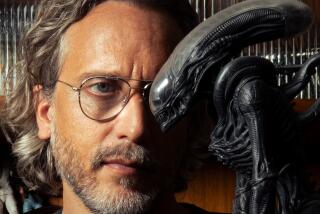Review: ‘Interstellar’ explores outer and inner spaces

Los Angeles Times Film Critic Kenneth Turan reviews “Interstellar.” Starring Matthew McConaughey, Anne Hathaway and Jessica Chastain. (Video by Jason H. Neubert).
- Share via
Memorable science fiction thinks the unthinkable so we don’t have to.
If earlier generations fretted about nuclear radiation or alien invasion, what powers Christopher Nolan’s altogether remarkable “Interstellar” is an up-to-date concern about the continued viability of a degraded planet Earth as home for the human race. Could it be true that, as one character succinctly puts it, “we’re not meant to save the world, we’re meant to leave it”?
Written by director Nolan and his brother Jonathan and starring the powerhouse trio of Matthew McConaughey, Anne Hathaway and Jessica Chastain, “Interstellar” is a near-future story of an intergalactic search for other planets that might support life in the way we’ve become accustomed to.
But though it’s a big studio blockbuster with all the traditional plot elements the term implies, “Interstellar” turns out to be the rarest beast in the Hollywood jungle. It’s a mass audience picture that’s intelligent as well as epic, with a sophisticated script that’s as interested in emotional moments as immersive visuals. Which is saying a lot.
For, especially if seen in 70-millimeter in the IMAX format its director prefers, “Interstellar” uses old-fashioned film to create some extraordinary images. More than an hour of “Interstellar” is shot in IMAX, with cinematographer Hoyte van Hoytema — who did Spike Jonze’s futuristic “Her” — at times carrying the machine on his shoulder, he said, “almost like the world’s heaviest GoPro camera.”
The Nolan brothers’ script, its use of familiar science fiction tropes aside, manages to investigate some compelling emotional material. Much less of a B picture dramatically than last year’s “Gravity,” its exploration of the ways in which love, mendacity and the core nature of humanity are informed by the physical and psychological demands of outer space ensures that this story will stay with you, its themes taking permanent residence at the back of your mind.
Clocking in at a daunting 2 hours and 49 minutes, “Interstellar” is also a film that won’t be rushed. Its first hour is spent exclusively on Earth, as Nolan and company thoroughly ground us in both the characters and the perhaps not-so-distant future world they inhabit.
What we see first is a series of filmed oral history interviews, as a variety of elderly parties describe their youth spent in the era in which “Interstellar” takes place.
It’s a time of terrible, soul-destroying drought (the look was inspired by Dust Bowl imagery from the 1930s) in which famine threatens the entire planet. A blight has killed all wheat, and governments heavily encouraged every able-bodied man to become a corn farmer to keep humanity alive.
This does not sit well with Cooper — Coop for short — played by McConaughey at his most casually charismatic. He’s a widower and former test pilot who dreams of adventure but now lives the desperate agricultural life with his grizzled father-in-law (John Lithgow) and his two children, straight arrow Tom (Timothée Chalamet) and 10-year-old Murphy (an animated Mackenzie Foy, Bella Swan’s daughter in the “Twilight” finale), whose feistiness and smarts echo those of her old man.
Ever the quester, Cooper follows a hunch that leads him to a secret underground bunker where a group of government scientists, knowing that Earth’s days are numbered, has decided to do something out of the box about it.
Having discovered a wormhole near Saturn, a shortcut through space and time to a different galaxy, the scientists, led by the venerable Dr. Brand (Michael Caine in his sixth Nolan film), have launched a series of probes in an attempt to locate another life-supporting planet, all the while wondering whether some benevolent force somewhere is helping them out.
Three promising locations have been found, and yet another interstellar expedition is being mounted to check them out. On the voyage will be Dr. Brand’s crisp daughter Amelia (Hathaway), two other scientists (played by Wes Bentley and David Gyasi), even a cheeky robot named TARS (voiced by Bill Irwin). The only thing missing is, yes, an experienced pilot.
Even though Cooper is beyond eager to take this on, there is a catch. The trip means leaving his family, especially a certain very unhappy 10-year-old, behind, and because of the mind-warping ways time works on flights like this, Murphy could possibly have died by the time Cooper returns. If he returns at all.
With its talk of wormholes, black holes, the fifth dimension and the puzzles of space and time, “Interstellar’s” script makes full use of the services of one of its executive producers, theoretical physicist Kip Thorne. But though some of the scientific specifics can be a bit daunting, the broad outlines of the story are always involving (especially when the adult Murphy, played by Chastain, enters the picture) and never difficult to follow.
If the science can get ethereal, it is one of the characteristics of a Nolan film that as much as possible of what you see was shot in the camera and created physically, not in a computer. In fact, two of the film’s space ships, weighing in at more than 10,000 pounds each, were reassembled on a remote glacier in Iceland that doubles as one of those far-away planets.
But “Interstellar’s” greatest accomplishment is that all those logistics didn’t stand in the way of the personal dimension, of a story that understands that the qualities that make us human is the most special effect of all.
------------
‘Interstellar’
MPAA rating: PG-13 for some intense perilous action and brief strong language
Running time: 2 hours, 49 minutes
Playing: In general release
More to Read
Only good movies
Get the Indie Focus newsletter, Mark Olsen's weekly guide to the world of cinema.
You may occasionally receive promotional content from the Los Angeles Times.











